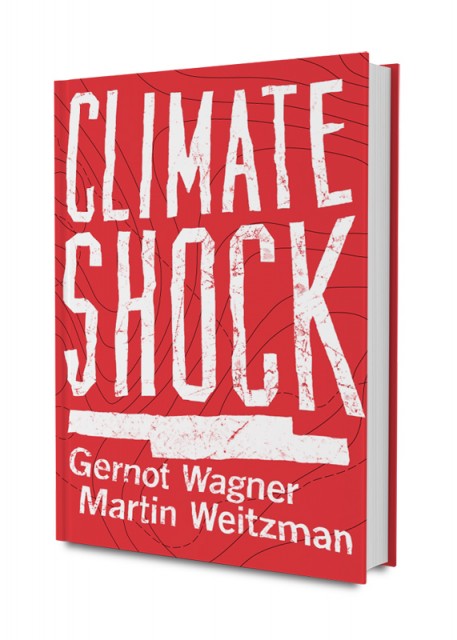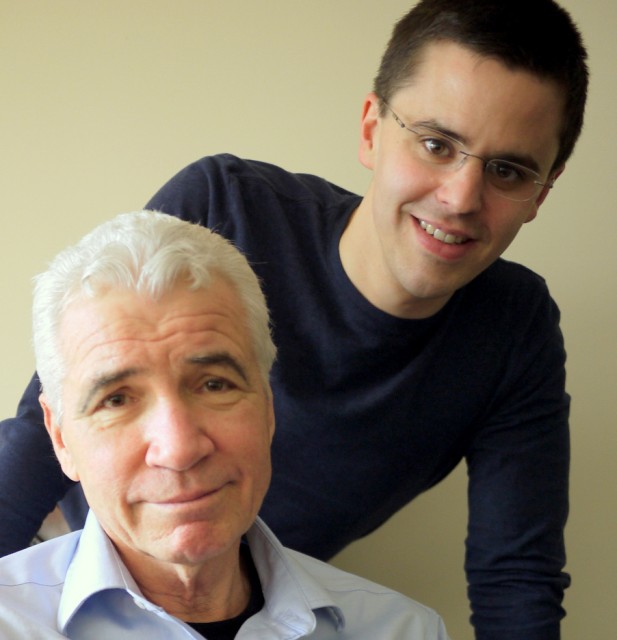
Most authors of books on economics discuss what we know, but Gernot Wagner focuses on what we don’t. Tail events, the Black Swans, the unknown unknowns. The future.
Wagner’s new book, Climate Shock, co-authored with Martin Weitzman and soon to be released, discusses the unforeseen effects of human influences on the environment. “Every other book on climate change that I’ve read talks about what we know. This one talks about what we don’t know.”
[pullquote align=”left”]When climate impacts hit each other like dominoes, it’s hard to predict all the possible outcomes[/pullquote]The book is a confluence of economics and environmental issues by two highly regarded individuals in the field. Wagner is the Lead Senior Economist at the Environmental Defense Fund and is an adjunct professor at Columbia University. Weitzman is a Professor of Economics at Harvard, and has authored numerous papers on environmental economics, among other topics. As a student, Wagner studied with and was a teaching assistant for Weitzman, and said how meaningful it was to write a book with a teacher he admired.
Despite their prestigious titles and daunting educational backgrounds, they aimed to write a book that is accessible and fun to read for all audiences. One chapter, 007, is actually a screenplay. “You can laugh now about a couple of economists writing a screenplay,” said Wagner. “The burden is on the storyteller to explain in plain English so that everybody can understand.”
So what will the planet be like with a three degree Celsius temperature increase? What about at six degrees? How much exactly will the temperature increase anyway? What are all of the consequences of climate change?
[pullquote align=”right”]Fortunately, we do know policies that work to lessen risk. Sweden, for instance, already has a high tax on carbon.[/pullquote]At this point there are no definitive answers. “No serious scientist will venture a guess at what six degrees will be like” says Wagner. The planet will likely not have an equal distribution of temperature increase, but vary depending on latitude, with more warming at the poles (a dynamic that leads to more rapid melting of the ice sheets).
Wagner discussed what he believes to be the inevitability of moving coastal cities, like New York, to higher ground. [See our related 2013 interview with geophysicist Klaus Jacob.] The cheap scenario is moving cities over hundreds of years, but the expensive scenario would be within a span of decades. Up to recent years, New York City was hit by a major storm approximately every hundred years. It was then hit with two “100 year storms” within the past few years. “I can’t tell you when the next Sandy-like ‘hundred-year storm’ will hit,” said Wagner, “but it won’t take another hundred years.”
The latest projections are that in fifty years intensity of storms will increase, with their coastal effects amplified by a higher sea level. The range in projections from climate models spreads out the further in the future one looks, and spans safer outcomes, and more dangerous outcomes, along an underlying trend. [See NPCC report for New York’s forecast to 2100.] “If we knew for sure, we’d know how to prepare. But we don’t. Therein lies the problem.”
Burning fossil fuels increases greenhouse gases in the atmosphere and increases the heat energy of the climate system. Stronger storms hit communities that had rarely experienced extreme weather. It may be reasonable to begin to guess at how the effect rising sea levels will affect have on coastal areas—and “average predictions are bad enough.” When these reactions hit others like dominoes, it becomes more difficult to say for sure what the outcome will be, but Wagner points out that chances are it’ll be worse.

What will be the future weather patterns of a given area with more intense storms? What kind of crops can grow at each location? What’s the availability of water, and at what quality? And we don’t just have to worry about how all of this directly affects humans; there are plenty of indirect ways the effects of climate change can reach us. How do these changes affect birds, insects, plant species? If one species can’t handle the new world, what will that mean for the food web, or for the loss of ecological services? Too many factors are intertwined to be able to accurately predict how events will affect each other.
We clearly need to investigate these questions, but in many ways, that misses the point, according to Wagner. “What we know is already bad enough. There’s only so many times you can say we’re running out of time before we actually run out of time.” Instead of pinpointing all of the unknown unknowns, we ought to start taking steps to minimize damage.
“One good analogy is to compare the climate crisis to the most recent stock market crash.” The problem: privatizing benefits and socializing costs. There is, of course, a crucial difference. No bailout, no amount of money, can reset the state of the environment; not within our lifetimes.
Meanwhile, things are looking up, slowly. Carbon pollution limits are slowly but surely spreading across the globe. Cap and trade policies are being implemented; even China is experimenting with them, and is expected to announce a nation-wide cap-and-trade system next year. India set a coal tax, and though still dependent on coal, is now rapidly building solar.
The European Union already has in place a cap-and-trade system for carbon emissions. Sweden has a $150-per-ton tax on carbon dioxide, and – as a result – has a largely decarbonized electricity sector. “ (See a range of carbon taxes in use.) Wagner attributes the largely decarbonized Sweden to the one law of economics: the law of demand. If price goes up, demand goes down.
California, already a leader in the US for environmental initiatives, caps 85% of all greenhouse gases. In Canada, British Columbia has a successfully functioning carbon tax. Implementing similar systems nationwide would reap large benefits. “Pollution isn’t free, but at the moment we are socializing those costs. We’d never dream of just dumping our garbage on the street. We pay someone to pick it up. Same here: put the appropriate price on carbon pollution.”
While national policies yield bigger results, Wagner encourages steps on the individual level because they create momentum in the right direction. However, as an economist he does worry about setting the right incentives. Anyone who has ever been on a diet can understand the basics. You go to the gym and have a good workout, but later you reward yourself with a cookie. Because you did the one action, you weren’t too concerned about what followed it. (Columbia’s Center for Research on Environmental Decisions includes this human quirk in their insightful guide to behavior change and communications, with the name “Single Action Bias.”)
Wagner worries about people performing small actions, like using a thermos everyday instead of disposable cups, and then missing the big picture, like voting for a stronger climate policy. “If all the little things you do every day lead to bigger action, great. What worries me is that doing those little things distracts us from doing what’s truly necessary. In the end, it all comes down to setting the right incentives.”

Local actions to discourage the use of plastic bags are a good example. “We’ve tried all sorts of things. Naming and shaming. Telling kids to recycle more. The whole lot. What really did the trick – in places from Ireland to Washington, DC – was to charge for plastic bags. In many ways, it was a nominal fee, but that has made all the difference.”
Washington DC charges a fee per bag, San Francisco and Austin have banned them entirely. New York has already taken impressive steps with local initiatives, Wagner especially noted the new bike paths and biking culture in the city, but there is still room for improvement. A bag fee could easily be put into practice, as well as a no-idling law for delivery trucks to reduce emissions.
Wagner himself very much lives as low impact as he can, but he also knows the limitations of his actions. On the inside jacket of his last prior book, But Will the Planet Notice?, his short and very much to the point bio comically said: “He doesn’t eat meat, doesn’t drive, and knows full well the futility of his personal choices.”
“By all means, recycle, don’t eat meat, lead the most environmentally conscious life you can,” said Wagner, “But don’t delude yourself. In the end it’s all about setting the right incentives for the rest of us. That begins with privatizing benefits and costs. Set the right price on carbon emissions, and get out of the way. That’s the way to protect ourselves from the worst of the unknowns.”
Preview a chapter of Climate Shock.
Read a new report on what makes British Columbia’s carbon tax successful.